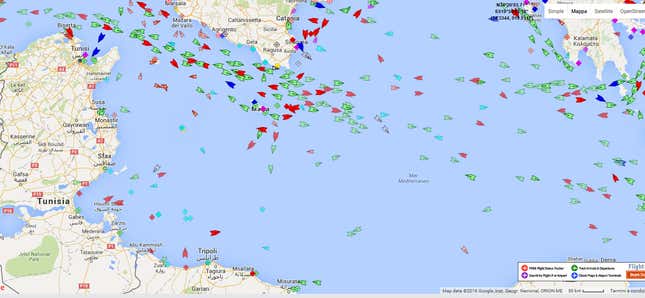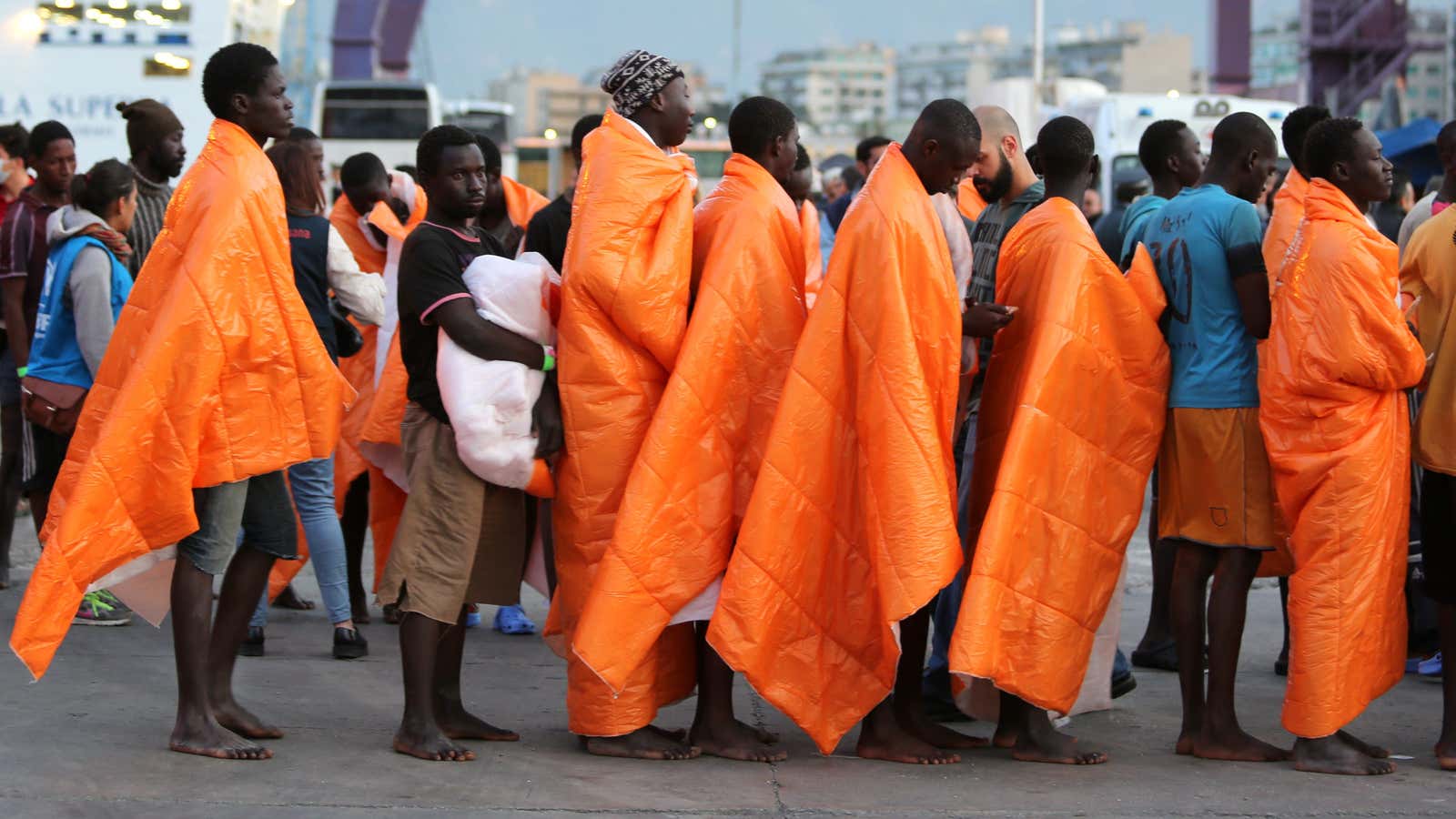Last year more than a million migrants and refugees risked their lives in overcrowded, often barely seaworthy boats to cross the Mediterranean. Most of them were Syrians, making the trip from Turkey to Greece in an attempt to get inside the borders of the European Union.
But the Turkey-Greece route—now down to a trickle after a deal between Turkey and the EU in March—is only one of two main ways across the Mediterranean. The other, used mainly by migrants from the Maghreb and sub-Saharan Africa, goes from the northern African coast (typically Libya) to Sicily. Fewer people take it—153,000 in 2015, compared to some 850,000 for the Turkey-Greece route—but it’s much more dangerous. In 2015, according to the International Organization for Migration (IOM), nearly 2,900 people died on the Libya-Sicily route—1.85% of those who attempted the crossing, compared to fewer than 0.1% of those getting to Greece.
Because of its perilousness, this route, known as the Central Mediterranean route, is now the focus of the largest search-and-rescue program in European history, called Triton. It has at least 18 vessels, four aircraft, and two helicopters patrolling the Mediterranean. The Italian government, once solely responsible for all search-and-rescue efforts in the area, has another three warships and an aircraft carrier out at sea, plus the entire coast guard fleet. Several independent organizations help too.
This combined operation has saved hundreds of thousands of lives—including more than 100,000 so far this year, according to the Italian coast guard—thanks to a well-oiled rescue protocol. And despite all those boats and aircraft, the protocol doesn’t rely on sea patrols and sightings of vessels in peril. Instead, it starts with a phone call.
The departure
When the weather is good up to 10 or 15 migrant boats leave Libya daily, according to Paolo Monaco, an Italian coast guard commander who leads the rescue operations out of the island of Lampedusa, Italy’s southernmost point. He says that migrants are typically stacked in two types of vessels: rubber boats that fit about 100 people, and old trawlers typically with anywhere between 300 and 600 people on board. Rubber boats are especially risky because “they have a very fragile structure, and it’s enough to overload them that often they collapse,” explains Monaco. “The worse the weather conditions, the sooner that structural damage will occur.”
These vessels, Monaco says, have no safety equipment, and no lights or flares to signal their position. Before they leave them at the mercy of the sea, all the smugglers give the migrants are a compass and a satellite phone, with one number saved on speed dial.
The first phone call
That number is Italy’s emergency number for help at sea, managed by the coast guard in Rome.
There are 155 nautical miles (178 miles, or 287 km) between the Libyan coast and Lampedusa, and Monaco says most boats call for help at about 30 to 50 nautical miles from the Libyan shore, after only a few hours of sailing. Sometimes, the boats are so precarious that they start sinking right after they leave. Other times, the crowds on the boat may just panic, and fear the worst before it’s even happening.
These excerpts of their calls to the coast guard give a sense of their desperation—and confusion:
Dozens of calls for help reach Rome every week. The trouble is, the migrants often aren’t able to tell the coast guard where they are. That brings in another player: Thuraya.
The second phone call
Based in Abu Dhabi, Thuraya is one of the world’s largest satellite-phone companies (it says it sold 82,000 handsets in 2015). Thuraya’s service extends to much of the world, but has particularly good coverage of the Mediterranean. Monaco says the phones given to migrants are all Thurayas, as evidenced by the virtual country code (+882 16) on incoming calls.
So when the call comes in, the coast guard notes the number and gets in touch with Thuraya’s headquarters, where a 24/7 support service provides the exact coordinates of that phone. (Thuraya provides this location service in emergencies, such as the aftermath of the earthquake in Nepal, and to partners such as the UN and national coast guards, including Italy’s.) Getting the exact location, Monaco says, takes between 40 minutes and an hour.
The coast guard says that as the number of migrants in the Mediterranean has gone up, it has been making more location requests to Thuraya. (Thuraya denies seeing any increase.)
The third phone call
Once the phone is located, though, there’s still one more procedural wrinkle. At 30 to 50 nautical miles from the Libyan coast, a boat would be outside both Italy’s and Malta’s Search And Rescue (SAR) responsibility areas (pdf, p. 7) under international maritime law. ”So we call Libya,” Monaco says.
The body in charge of search and rescue in Libya often doesn’t reply. “Even when it replies,” Monaco explains, “it’s to say that naturally at this moment in time it doesn’t have the organization or the means to intervene.” That puts Italy back in charge of the rescue, as the country that received the first request for help. So now it can finally send it.
The fleet
At this point, the coast guard has at its disposal its own boats, a large fleet of other search-and-rescue vessels including Triton’s, and even private ships, who are obliged to help out with a rescue if so instructed. The coast guard constantly monitors (through ship-tracking services, such as the one in the image below) the vessels in the area, and can send one near the sinking boat to the rescue.

Not just any ship can be sent in, though. Some cannot operate in bad weather, and size is a consideration: If a ship is too big, it can be hard for it to get close to a sinking rubber boat, while if it’s too small, it may have trouble rescuing all the people on a trawler.
Often, and especially in rough weather, the coast guard uses its own fleet for the rescue, typically the vessels in Lampedusa. But since Triton’s mission was expanded in 2015, the coast guard can rely on more search and rescue boats out patrolling, which has made things much easier, Monaco says. “Having ships 80 miles out of Lampedusa and therefore near the Libyan coasts means arriving in one hour instead of four hours.”
Safe harbor
Not every ship full of migrants is rescued this way. Some are found by patrol ships or helicopters after many days at sea, and sometimes shipwrecks happen too quickly for help to get going. Occasionally, boats also get much closer to the Italian coast. But this is, increasingly, the way each rescue begins: with that first, panicked call to Italy.
Not everyone is happy with this. Filippo Solina, a fisherman from Lampedusa who has helped rescue hundreds of migrants from vessels that made it close to the Italian coast, says the rescue operation is too broad. “One can save you if you arrive 20 miles from here, or close to us,” he says, “but not go pick you up [almost] in a Libyan harbor.” Some governments agree; the UK, one of the most resistant to financing search and rescue missions, sees them as encouraging illegal immigration.
“Many ask how it is possible that Italy intervenes outside its area of responsibility,” says Monaco. But to him the point is moot—if they are called, it’s their job to go. “There is a moral duty, because obviously one can’t let people die like that, knowing that they are at the mercy of the waves and the sea,” he explains. “But there is also a legal obligation that comes from international regulations.”
